How
I built my Seagull
by Paul Groom
Seagull
- 15' 3" rowing dory - designed by John Welsford
I have never built a boat before,
the inspiration came when we moved to a house near a local inner
harbour beach in Auckland NZ. I had a big empty shed, some spare
time, a three year old son and summer round the corner
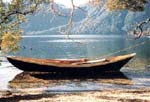 A
friend showed me plans for John
Welsford's light dory, it looked pretty simple and practical,
but after a call to John he suggested his Seagull which has a
bit more room for the family. I had to wait a bit for the plans
as John is a busy man, so if your letterbox is empty dont despair,
they will arrive in time! John is also very helpful if you have
a problem, many thanks to him for his support. His website is
at time of writing still being finished but its a great place
to have a look at what he's up to. A
friend showed me plans for John
Welsford's light dory, it looked pretty simple and practical,
but after a call to John he suggested his Seagull which has a
bit more room for the family. I had to wait a bit for the plans
as John is a busy man, so if your letterbox is empty dont despair,
they will arrive in time! John is also very helpful if you have
a problem, many thanks to him for his support. His website is
at time of writing still being finished but its a great place
to have a look at what he's up to.
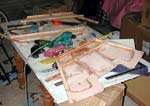 I
have a Triton sawbench, the kind where you fit your power tools
into (better than nothing but annoying unless the circular saw
you use is big and strong), a sander, jigsaw, drill and an odd
collection of handtools. My previous building experience is next
to zero, handicapped by pigheadedness disguised as enthusiasm.
In other words I have a lot to learn. I
have a Triton sawbench, the kind where you fit your power tools
into (better than nothing but annoying unless the circular saw
you use is big and strong), a sander, jigsaw, drill and an odd
collection of handtools. My previous building experience is next
to zero, handicapped by pigheadedness disguised as enthusiasm.
In other words I have a lot to learn.
 My
building method was to have a go first, make a disaster, fix it
up on second or third attempt and as soon as it looked remotely
passable move on. This is not the best way to get your boat on
the front cover of a glossy mag, but it is a good trade off for
learning and getting the thing in the tide vs a work of art. In
the future I would probably go a bit slower, read a few more books
and ask a few more questions. the main problem manifested in big
daggy fillets, lumpy glue lines and despair at sanding it all
back. On the bright side I kept the West people in a job! After
finishing it I found a few links to good glue techniques which
I advise the newbie to read a couple of times to save a lot of
sanding. My
building method was to have a go first, make a disaster, fix it
up on second or third attempt and as soon as it looked remotely
passable move on. This is not the best way to get your boat on
the front cover of a glossy mag, but it is a good trade off for
learning and getting the thing in the tide vs a work of art. In
the future I would probably go a bit slower, read a few more books
and ask a few more questions. the main problem manifested in big
daggy fillets, lumpy glue lines and despair at sanding it all
back. On the bright side I kept the West people in a job! After
finishing it I found a few links to good glue techniques which
I advise the newbie to read a couple of times to save a lot of
sanding.
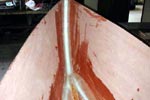 The
more accurate your woodwork the better. I had the attitude that
epoxy cures all, true but its better to use as little as possible
to save on finishing time. The
more accurate your woodwork the better. I had the attitude that
epoxy cures all, true but its better to use as little as possible
to save on finishing time.
As soon as I got the plans I launched
into it by penciling out the bottom and sides directly on to the
ply, cutting them out and butt joining them (remember to join
the both sides from the inside!) After a bit of head scratching
I managed to interpret the frame construction and glued it all
together.
 The
construction process it pretty simple and in less than three 2
hour days of cutting and gluing I had a basic boat stitched together
with electrical ties. The
construction process it pretty simple and in less than three 2
hour days of cutting and gluing I had a basic boat stitched together
with electrical ties.
After a spot of guess work I managed
to get the fillets and glass tape on, I used the 12 oz double
bias tape, you can cut cloth into strips to save a few dollars
but I chose the easy way. The next job was to glue the frames
in place and then the gunwales. I had a problem here with a glue
mix that was still chewing gum after 2 days. I got a bit worried
when West tech support said start again, however John reassured
me that it would set and sure enough after a week it was hard,
Whew! Instead of clamps I used drywall screws and did things like
putting the inwale spacers on first rather than clamping later.
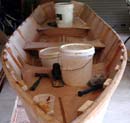 All
done and finishing time. I got a bit depressed with the mess I
had made with the glue and after many hours sanding and a couple
of attempts at fairing I gave up and decided to let the paint
"hide a multitude of sins" Of course this didnt work
but it serves as a lesson for next time. I did find though that
after a supreme effort at finishing and you dont know if you have
done enough, a coat of primer will give you an even background
to see if you work is ok, and if not a bit more fairing mix still
sticks ok. All
done and finishing time. I got a bit depressed with the mess I
had made with the glue and after many hours sanding and a couple
of attempts at fairing I gave up and decided to let the paint
"hide a multitude of sins" Of course this didnt work
but it serves as a lesson for next time. I did find though that
after a supreme effort at finishing and you dont know if you have
done enough, a coat of primer will give you an even background
to see if you work is ok, and if not a bit more fairing mix still
sticks ok.
And it floats!
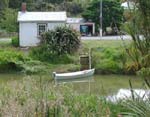 The
maiden voyage was over a 5km channel to an Island in the Hauraki
Gulf, three up with 100kg of camping gear. With a 1 metre wind
chop on the quarter she handled it well. The
maiden voyage was over a 5km channel to an Island in the Hauraki
Gulf, three up with 100kg of camping gear. With a 1 metre wind
chop on the quarter she handled it well.
Not so sure of bigger nasty stuff,
but these shots are a few days later going up a local estuary
for a picnic.
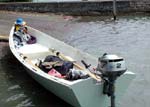 The
Honda 2 horse is a great little beastie. I have nothing to compare
it to but at full throttle its a bit noisy in a thumpy way as
opposed to 2 stroke whining. No smell! and it used about 600ml
(1 pint) for about 50 minutes running. So you could safely work
on 1 litre per hour at full pelt. The
Honda 2 horse is a great little beastie. I have nothing to compare
it to but at full throttle its a bit noisy in a thumpy way as
opposed to 2 stroke whining. No smell! and it used about 600ml
(1 pint) for about 50 minutes running. So you could safely work
on 1 litre per hour at full pelt.
Under oars its a pleasure to pull
and feel the boat move sweetly away. I dont have enough experience
to make distinctions, but she rows fine for me.
And our summer is just arriving!
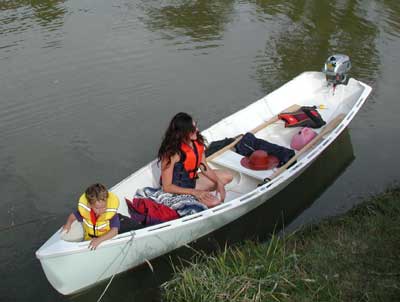
|

